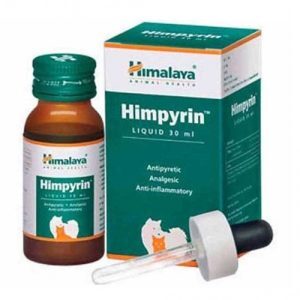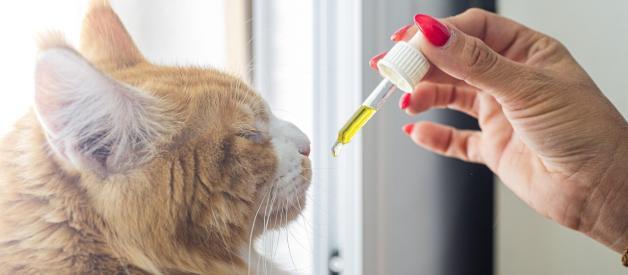Table of Contents
Himpyrin is a natural antipyretic remedy that obstructs the synthesis of prostaglandins, effectively curbing fever in pets. Additionally, this medication mitigates pain by hindering the release of pain transmitters. Enriched with Tinospora Gulancha (Guduchi), it bolsters the immune system, enhancing the body’s ability to fend off infections. Furthermore, Sweet Flag (Vacha) fosters improved blood circulation and mitigates swelling.

What Is Himpyrin?
Himpyrin is a meticulously tested herbal remedy designed to address fever, inflammation, and pain in dogs and cats. It boasts antipyretic attributes, effectively addressing fevers stemming from diverse underlying causes. Its analgesic properties relieve discomfort, while its anti-inflammatory effects contribute to long-term well-being. Notably effective post-injury or surgery, Himpyrin’s liquid drop formulation showcases its prowess as a comprehensive solution for the well-being of pets.
Reducing fever is achieved through inhibiting cyclooxygenase (COX) 1 and 2 enzymes, pivotal in synthesizing prostaglandins. These hormones, produced at tissue damage or infection sites, are implicated in inflammation, pain, and fever, all crucial components of the body’s healing process. Consequently, Himpyrin’s action emerges as a dependable method to quell fever in pets.
Beyond its antipyretic properties, Himpyrin excels as a pain-relieving agent, effectively curtailing the release of pain-related neurotransmitters and thwarting the sensitization of nerve fibers. Its versatile application encompasses fevers stemming from many underlying causes, with a pronounced efficacy in injury or post-surgical recovery scenarios.
Ingredients
Tinospora Gulancha is an immunomodulator renowned for bolstering the body’s immune system. Its inclusion in Himpyrin signifies its crucial role in enhancing pets’ overall health and resistance.
It is recognized for its adaptogenic properties, meaning it helps the body adapt to various stressors and maintain a state of balance. This is particularly valuable in supporting pets’ immune responses against infections and diseases. Its active compounds are believed to stimulate the production of immune cells, contributing to a robust defense mechanism.
Furthermore, Tinospora Gulancha is associated with anti-inflammatory effects, which align with Himpyrin’s goal of alleviating pet fever and inflammation. By reducing inflammation, Guduchi aids in relieving discomfort and promoting the healing process. Its contribution to Himpyrin’s formula underscores the product’s holistic approach to pet health, combining antipyretic, analgesic, and immune-boosting properties for comprehensive wellness.
Sweet Flag is another key component of Himpyrin, contributing its unique attributes to the herbal formulation. One of Sweet Flag’s standout qualities is its potential to enhance blood circulation. Improved blood flow is essential for efficient nutrient delivery and waste removal, supporting the body’s healing processes and overall vitality. By promoting circulation, Sweet Flag complements Himpyrin’s objectives by aiding in reducing swelling and inflammation.
Moreover, Sweet Flag is noted for its potential cognitive and nervous system benefits. It is believed to possess calming properties that could contribute to a sense of relaxation and ease. While not directly related to Himpyrin’s fever-reducing and pain-relieving functions, this aspect showcases the multi-dimensional nature of the herb and how its inclusion in the formula could offer supplementary advantages for pets’ well-being.
Incorporating Tinospora Gulancha and Sweet Flag in Himpyrin underscores the product’s commitment to holistic care. These botanical ingredients bring immune support, anti-inflammatory effects, improved circulation, and potential calming benefits to the table, amplifying Himpyrin’s overall efficacy as a comprehensive herbal solution for pets’ health challenges.
Dosage Sizes
The recommended dosage can be adjusted based on the specific breed and/or the severity of the condition, following the guidance of a veterinarian.
|
Pet Type |
Dosage Range (ml) |
Frequency |
|
Dogs (Small breeds) |
1-2 |
Twice daily |
|
Dogs (Large breeds) |
2-3 |
Twice daily |
|
Cats |
1 |
Twice daily |
Important Safety Information for Pet Owners
Before starting any new medication or supplement for your pet, consult a qualified veterinarian. They can provide personalized guidance based on your pet’s health history, current medications, and specific needs. Always measure the dosage accurately using the provided measuring device or dropper. Ensure that you are administering the correct amount as directed by your veterinarian. Dosage adjustments may be necessary based on your pet’s breed, size, and health condition.
Monitor your pet closely for any adverse reactions after administration. If you notice any unexpected changes in behavior, appetite, or physical condition, discontinue use and seek veterinary advice. While Himpyrin is formulated with natural ingredients, allergic reactions can still occur. Watch for itching, swelling, redness, or difficulty breathing. If any of these symptoms arise, discontinue use and consult a veterinarian.
Inform your veterinarian about other medications, supplements, or treatments your pet receives. There might be potential interactions that could impact the effectiveness or safety of Himpyrin. If your pet has pre-existing health conditions, such as liver or kidney issues, discuss the use of Himpyrin with your veterinarian. Certain conditions could influence the suitability of the product.
If your pet is pregnant, nursing, or intended for breeding, consult your veterinarian before administering Himpyrin. Certain ingredients may have implications for reproductive health.
If your pet’s condition worsens or does not show improvement after using Himpyrin, consult your veterinarian. They can recommend alternative treatments or interventions.
Veterinary Prescription
Himpyrin is a product that requires a prescription from a veterinarian for purchase. However, regulations and requirements can vary depending on your location and the specific product’s classification. It’s important to check with your local regulatory authorities, the manufacturer of Himpyrin, or a licensed veterinarian to confirm whether a prescription is needed to purchase Himpyrin for your pet.
Remember that laws and regulations can change over time, so it’s always best to get the most up-to-date and accurate information from reliable sources before purchasing. If Himpyrin requires a prescription, it’s crucial to consult a veterinarian to determine if the product suits your pet’s needs and to obtain the necessary prescription if required.
Interactions
Here is some general information about interactions that can occur with herbal supplements and medications like Himpyrin:
- Drug Interactions: Herbal supplements can interact with prescription medications, over-the-counter drugs, and other supplements. These interactions can affect the effectiveness or safety of the herbal supplement and the medication.
- Anticoagulants: Some herbal supplements can have anticoagulant (blood-thinning) properties. If your pet is on anticoagulant medications, combining them with Himpyrin might increase the risk of bleeding.
- Liver and Kidney Health: Herbal supplements can sometimes affect liver and kidney function. If your pet has pre-existing liver or kidney conditions or is taking medications that affect these organs, consult a veterinarian before using Himpyrin.
- Allergies and Sensitivities: Pets, like humans, can have allergies or sensitivities to certain herbs. When introducing a new herbal supplement, it’s essential to monitor your pet for any signs of allergic reactions or adverse effects.
- Gastrointestinal Effects: Some herbal supplements can affect the gastrointestinal tract, causing upset stomach or other digestive issues. If your pet has a sensitive stomach or has had gastrointestinal problems, consult a veterinarian before using Himpyrin.
- Pregnancy and Lactation: If your pet is pregnant, nursing, or intended for breeding, certain herbal supplements may have effects on reproductive health. Consult a veterinarian before using Himpyrin in these situations.
To ensure the safety and well-being of your pet, it’s recommended to consult a veterinarian before introducing any new herbal supplement or medication. Your veterinarian can guide potential interactions, appropriate dosages, and whether Himpyrin suits your pet’s health needs.

Side Effects
There are no reported cases of side effects. However, here is the general information about potential side effects that can occur with herbal supplements and medications like Himpyrin:
- Allergic Reactions: Herbal supplements can sometimes cause allergic reactions in pets, just as in humans. Signs of an allergic reaction may include itching, redness, swelling, hives, difficulty breathing, or gastrointestinal distress.
- Gastrointestinal Upset: Some herbal supplements can cause gastrointestinal upset, including symptoms like vomiting, diarrhea, or changes in appetite. If your pet experiences digestive issues after taking Himpyrin, consult a veterinarian.
- Interaction with Other Medications: Himpyrin may interact with other medications your pet is taking, leading to adverse effects. This is especially relevant if your pet is on other medications, so it’s essential to consult a veterinarian before using Himpyrin.
- Blood-Thinning Effects: Certain herbs can have blood-thinning properties. If Himpyrin contains such herbs, it could lead to bleeding issues, especially if your pet is also on medications with blood-thinning effects.
- Organ Function: Some herbal supplements can impact liver or kidney function. If your pet has pre-existing liver or kidney conditions, using Himpyrin without veterinary supervision could worsen these issues.
- Sensitivity: Pets can have varying sensitivities to herbs and supplements. Even if an herbal supplement is generally safe, your pet might have an unusual reaction. Monitoring your pet for any changes in behavior, appearance, or health when using Himpyrin is important.
- Pregnancy and Lactation: If your pet is pregnant, nursing, or intended for breeding, certain herbs in Himpyrin might affect reproductive health. Consult a veterinarian before using the supplement in these situations.
If you notice any of these symptoms, discontinue using Himpyrin and seek veterinary attention.
Overdose
Overdosing on herbal supplements can have adverse effects on your pet’s health. If you suspect that your pet has ingested more Himpyrin than the recommended dose, or if you notice any unusual symptoms after administering the supplement, it’s essential to take prompt action:
- Contact a Veterinarian: If you suspect an overdose, contact your veterinarian immediately. They can guide what steps to take based on the specific supplement or medication and your pet’s condition.
- Monitor for Symptoms: Watch for any unusual symptoms or changes in behavior in your pet. These could include vomiting, diarrhea, lethargy, increased heart rate, difficulty breathing, tremors, seizures, or abnormal behavior.
- Provide Information: If you reach out to your veterinarian, provide them with accurate information about the supplement or medication, including its name, ingredients (if known), and the approximate amount your pet ingested.
- Seek Emergency Care: In severe cases, or if your pet shows severe symptoms such as seizures or difficulty breathing, seek emergency veterinary care. It’s always better to err on the side of caution when dealing with potential overdoses.
Prevention is the best approach to avoiding overdose. Always follow the recommended dosage instructions provided by your veterinarian or on the product packaging. If you need more clarification about the appropriate dosage for your pet, consult your veterinarian before administering any supplement.
Storage
Store Himpyrin in a cool, dry place. Avoid direct sunlight, heat, and moisture exposure, as these factors can degrade the product. Many medications are best stored at room temperature, which typically ranges between 59°F and 77°F (15°C to 25°C). Extreme temperatures can affect the stability of the product.
Store Himpyrin out of reach of children and pets to prevent accidental ingestion.
It’s advisable to keep Himpyrin in its original packaging. The packaging often protects from light and humidity, preserving the product’s quality. Ensure the container or packaging is tightly sealed to prevent moisture and air exposure after each use.
Unless otherwise specified, avoid storing Himpyrin in the freezer, as freezing temperatures can alter the composition of some medications.
Keep information about Himpyrin, such as the name, dosage instructions, and potential side effects, in an accessible place for reference.
FAQ
How does Himpyrin work?
Himpyrin works by inhibiting the enzymes cyclooxygenase (COX) 1 and 2, which are involved in the production of prostaglandins, hormone-like substances that cause inflammation, pain, and fever. By reducing prostaglandin synthesis, Himpyrin helps alleviate these symptoms.
Is Himpyrin safe for pets?
Himpyrin is generally safe for pets when used as directed by a veterinarian. However, it’s important to consult a veterinarian before administering Himpyrin to ensure it’s appropriate for your pet’s health condition and to determine the correct dosage.
Can Himpyrin be used for all pet breeds and sizes?
Himpyrin’s dosage can be adjusted based on the breed and size of your pet. There are specific dosing recommendations for small and large dog breeds, as well as for cats. Consult a veterinarian to determine the appropriate dosage for your pet.
Can Himpyrin be given to pregnant or nursing pets?
If your pet is pregnant, nursing, or intended for breeding, consult a veterinarian before administering Himpyrin. Some herbal ingredients might have implications for reproductive health.
Can Himpyrin be used long-term for chronic conditions?
Himpyrin contains anti-inflammatory properties that can be beneficial for long-term health. However, consult a veterinarian before using it for chronic conditions to ensure it aligns with your pet’s overall treatment plan.
Olivia Bennet is a veterinarian who has worked in a veterinary clinic for many years. She specializes in the diagnosis, disease prevention, and treatment of not only cute kittens and puppies but also large farm animals. Olivia loves animals, cares about them, and wants to help you know more about your pets.

































